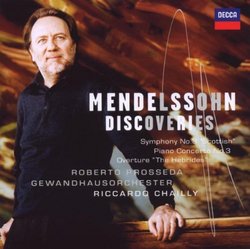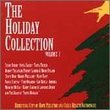| All Artists: Riccardo Chailly, Gewandhausorchester, Roberto Prosseda Title: Mendelssohn Discoveries: Rare Piano Works Members Wishing: 0 Total Copies: 0 Label: Decca Original Release Date: 1/1/2009 Re-Release Date: 10/6/2009 Genres: Special Interest, Classical Styles: Forms & Genres, Concertos, Symphonies Number of Discs: 1 SwapaCD Credits: 1 UPC: 028947815259 |
Search - Riccardo Chailly, Gewandhausorchester, Roberto Prosseda :: Mendelssohn Discoveries: Rare Piano Works
 | Riccardo Chailly, Gewandhausorchester, Roberto Prosseda Mendelssohn Discoveries: Rare Piano Works Genres: Special Interest, Classical |
Larger Image |
CD DetailsSimilar CDs |
CD ReviewsWow! Alexander Mendez | South Pasadena, CA United States | 11/30/2009 (5 out of 5 stars) "I only bought the mp3 album because I love the Hebrides Overture so much and I heard this early version of it on the radio and had to have it. I must admit that the early version is not as good as the one that is typically performed. The early version is substantially different so it will be of interest. However, the early version is a bit heavier and clumsier in its prototype. It is indeed a first draft. Serendipity would have it, though, that what I ended up falling in love with was the so-called concerto for piano that is on this cd. It is titled piano concerto no. 3, but from what I understand it is a reconstruction of a piece that was not finished by Mendelssohn. Its first movement, though, is passionate and beautiful with lovely repetitions of the main theme throughout in different guises that is crowned towards the end with the sweetest airiest exposition possible. It is absolutely a stunning piece and not to be missed by Mendelssohn admirers." Curious first versions, the highlight being a very fine Scot Santa Fe Listener | Santa Fe, NM USA | 12/28/2009 (4 out of 5 stars) "I have no idea what has galvanized Riccardo Chailly since leaving Amsterdam and going to Leipzig, but with his young, eager orchestra he sounds more committed and vigorous than he usually did with the far more accomplished Concertgebouw. The music world sat up for his excellent recordings of the Schumann symphonies as retouched by Mahler. Now here he is with "discoveries" in the same vein as the rarities he found in the archives of Verdi and Puccini. But in Mendelssohn's case we are dealing with first thoughts, and that's a tricky business. Shouldn't a great composer be known by his final works? We don't read first drafts of famous novels and poems, after all. Yet these are such vivacious performances that it's hard to not enjoy them.
The contents are as follows: Piano Concerto in E minor Roberto Prosseda (piano) Symphony No. 3 in A minor, Op. 56 'Scottish' London version, 1842 Hebrides Overture, Op. 26 Rome version, 1830 Sketch (Symphony No. 3 in A minor, Op. 56 "Scottish") Since my copy is a download lacking program notes, I must fudge on details and quote from Decca's blurb: Each work was influenced by the composer's travels to England and Scotland and presents Mendelssohn at his most programmatic. Mendelssohn began working on the rarely performed Piano Concerto No. 3 in 1830 (the same time as the other works on this album) though he eventually set his sketches aside. He resumed composition on later trips to England in the 1840s, but never completed the work. Through meticulous research, the sketches have been orchestrated and the composition completed while remaining faithful to Mendelssohn's style. Frankly, I don't hear much difference in this "London version" of the Scottish Sym. except for a few obvious patches, the main attraction being Chailly's really vibrant reading, one of the best since the heyday of Karajan and Bernstein. Traditionally, most conductors take the final theme at a slow grand pace, but this was apparently a misprint in the published score (!), and Chailly gives us Mendelssohn's much livelier tempo. The so-called excerpt from the Scottish is a 55 second throwaway. The Hebrides offers a startling march theme that is distinctly inferior to the all but perfect final overture. The reconstructed Piano Concerto No. 3 is a Victorian stuffed auk with only the most fitful interest, and as with almost all reconstructions, it sounds a bit think and underworked. But the themes are pleasant enough and the soloist attacks the score with vigor. The mercurial opening of the finale will remind you pleasantly of similar music in the Italian Sym. and Midsummer Night's Dream." |




